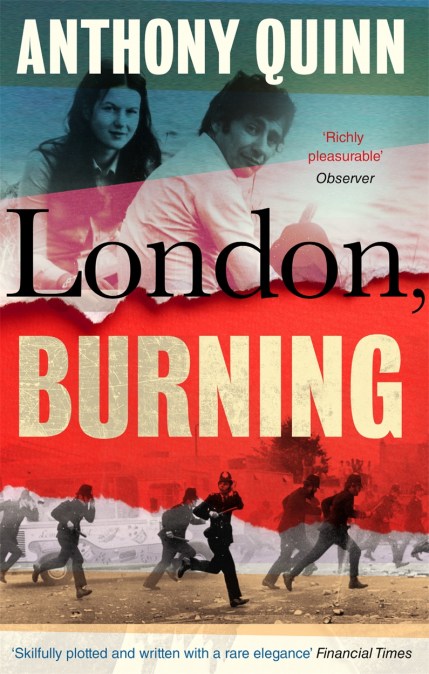London, Burning is a novel about the end of the 1970s, and the end of an era. It concerns a nation divided against itself, a government trembling on the verge of collapse, a city fearful of what is to come, and a people bitterly suspicious of one another. In other words, it is also a novel about now.
Vicky Tress is a young policewoman on the rise who becomes involved in a corruption imbroglio with CID. Hannah Strode is an ambitious young reporter with a speciality for skewering the rich and powerful. Callum Conlan is a struggling Irish academic and writer who falls in with the wrong people. While Freddie Selves is a hugely successful theatre impresario stuck deep in a personal and political mire of his own making. These four characters, strangers at the start, happen to meet and affect the course of each other’s lives profoundly. As the clock ticks down towards a general election old alliances totter and the new broom of capitalist enterprise threatens to sweep all before it. It is funny and dark, violent but also moving.
Vicky Tress is a young policewoman on the rise who becomes involved in a corruption imbroglio with CID. Hannah Strode is an ambitious young reporter with a speciality for skewering the rich and powerful. Callum Conlan is a struggling Irish academic and writer who falls in with the wrong people. While Freddie Selves is a hugely successful theatre impresario stuck deep in a personal and political mire of his own making. These four characters, strangers at the start, happen to meet and affect the course of each other’s lives profoundly. As the clock ticks down towards a general election old alliances totter and the new broom of capitalist enterprise threatens to sweep all before it. It is funny and dark, violent but also moving.
Newsletter Signup
By clicking ‘Sign Up,’ I acknowledge that I have read and agree to Hachette Book Group’s Privacy Policy and Terms of Use
Reviews
Peopled by the kind of strong, fully realised individuals whom you could easily identify in a crowd, it is skilfully plotted and written with a rare elegance, sinuous wit and even optimism. It is a deeply satisfactory read
Set during the dog days of the Callaghan Labour government, Anthony Quinn's latest period novel extends his richly pleasurable and loosely connected series portraying London down the decades. Since 2011, he has fused romance, mystery and social realism to produce a kind of epic Londoniad, tackling the city's Victorian slums (The Streets), the first world war (Half of the Human Race), the 30s (Curtain Call), the blitz (Our Friends in Berlin), the 50s and 60s (Freya and Eureka), and now the late 70s, a time of strikes, IRA violence and the imminent election of Margaret Thatcher. It's David Peace territory, but Quinn is a steadier, suaver writer, relying on the old-school charms of rounded characters and a clockwork plot
A multi-character tale of a paranoid, dirty London at the tired end of the seventies
If you like BBC political dramas, you'll love this tale set in 1970s London, in a time of strikes and bomb threats. It weaves together stories of a theatre impresario, a policewoman, a journalist and a writer as their lives are profoundly affected by their relationships with one another
Quinn is a witty and erudite writer who manages to make his characters' dialogue sound natural and engaging . . . Quinn's book is a page-turning delight. I can pay it no higher compliment than to say that, when I finished reading it, I felt almost sad that I was not going to be spending time with its characters any longer, and I hope that a sequel or continuation of this fascinating saga awaits in due course
Anthony Quinn's excellent seventh novel . . . highly enjoyable
Anthony Quinn is one of my favourite novelists and London, Burning didn't disappoint ... Set in the grimy, unglamorous world of the winter of 1979, when most public workers were on strike and the IRA were at large, London, Burning deftly weaves together the stories of Vicky, a young police officer, Hannah, a journalist, Callum, an academic and Freddie a bon viveur and theatre director, whose lives connect and coincide with dramatic consequences
[A] marvellous new novel . . . This master storyteller recreates the whole world of the 70s, as the London we used to know is about to change for ever. The novel throbs with music and life, love and skulduggery, with the beating drum of the approaching Margaret Thatcher sounding the knell for that decade and the way we used to live on these islands

